The First Event of the “Political Economy in China” Study and Research Program: Core Concepts of Classical Political Economy and Their Contemporary Significance
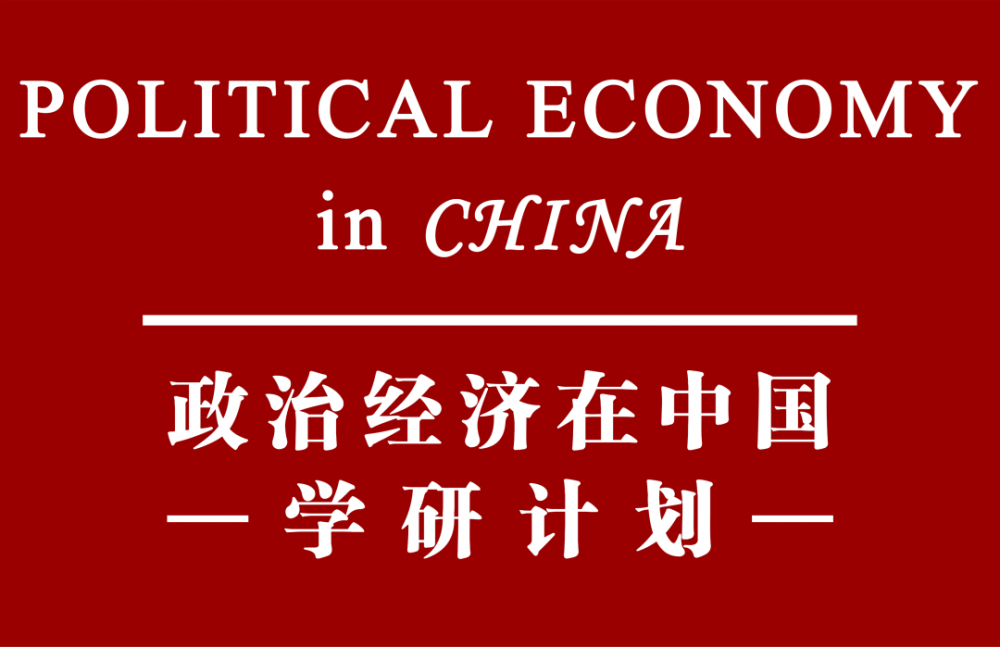
On December 27, 2023, the “Political Economy in China” Study and Research Program initiated its activities with the inaugural lecture entitled “Core Concepts of Classical Political Economy and Their Contemporary Significance” at Hall D114, School of Government (SOG), East Campus, SYSU. The lecture featured Professor Luo Weidong, a member of the 14th CPPCC National Committee, Director of the Institute of Advanced Study in Humanities and Social Sciences at Zhejiang University, and Professor of the School of Economics at Zhejiang University, as the keynote speaker. Professor Huang Dongya, Deputy Dean of the SOG, presided over the event. Professor Tan Ankui, Dean of the SOG, and Assistant Professor Zhao participated in the academic review, and Professor Zhu Yapeng, Professor Xia Ying, Professor Liang Pinghan, and Associate Professor Luo Siqi also attended the event.
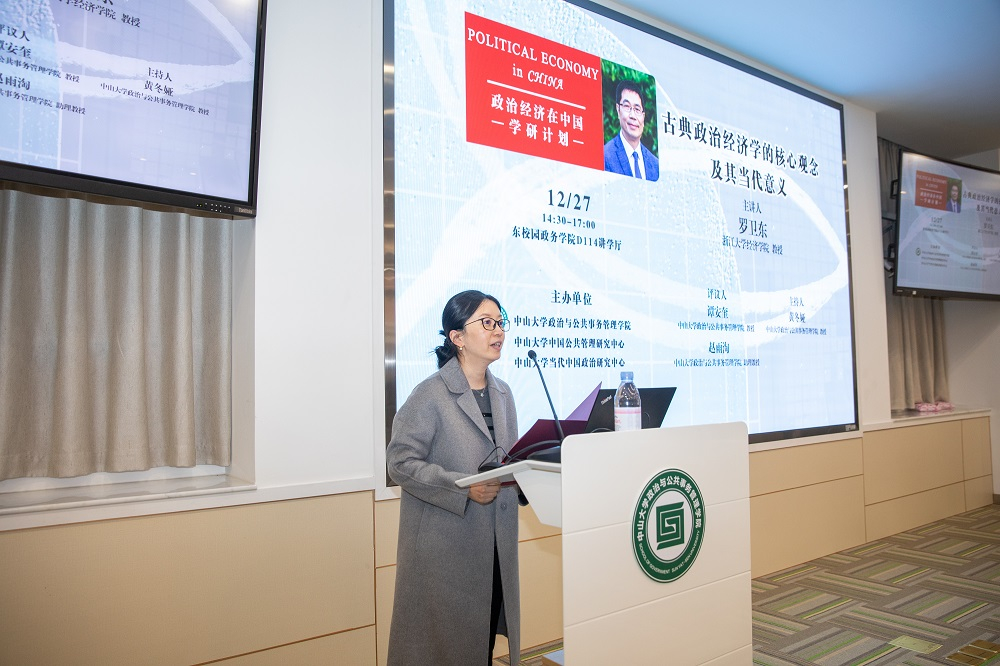
Professor Huang Dongya Presiding over the Event
Professor Tan Ankui, Dean of the SOG, delivered an opening speech, expressing his warm welcome and gratitude to Professor Luo Weidong for coming to SOG. He elucidated the significance and objectives of the Program, emphasizing its crucial role in exploring and reflecting upon the foundational theories of political-economic relations. He underscored the enduring importance of comprehending the interplay between politics and economy in the contemporary era, and the unique practical forms and intellectual implications of political economy in China will also come to the fore on this basis. The Program, conceived amidst the burgeoning landscape of the fragmentation of knowledge, aspires to offer a comprehensive perspective on the understanding and interpretation of modernization, with a focus on the crucial relationship between politics and economy. In this way, key academic issues that are realistically and contemporarily pertinent can be addressed. Professor Tan Ankui lauded Professor Luo Weidong’s exceptional contributions to economics and the history of economic thought, particularly his expertise in the Scottish Enlightenment School and classical political economics. Seasoned in the management work in humanities and social sciences at university, Professor Luo Weidong has been an advocate and practitioner of interdisciplinary research, making him the most eligible scholar for the inauguration of the “Political Economy in China” Study and Research Program.
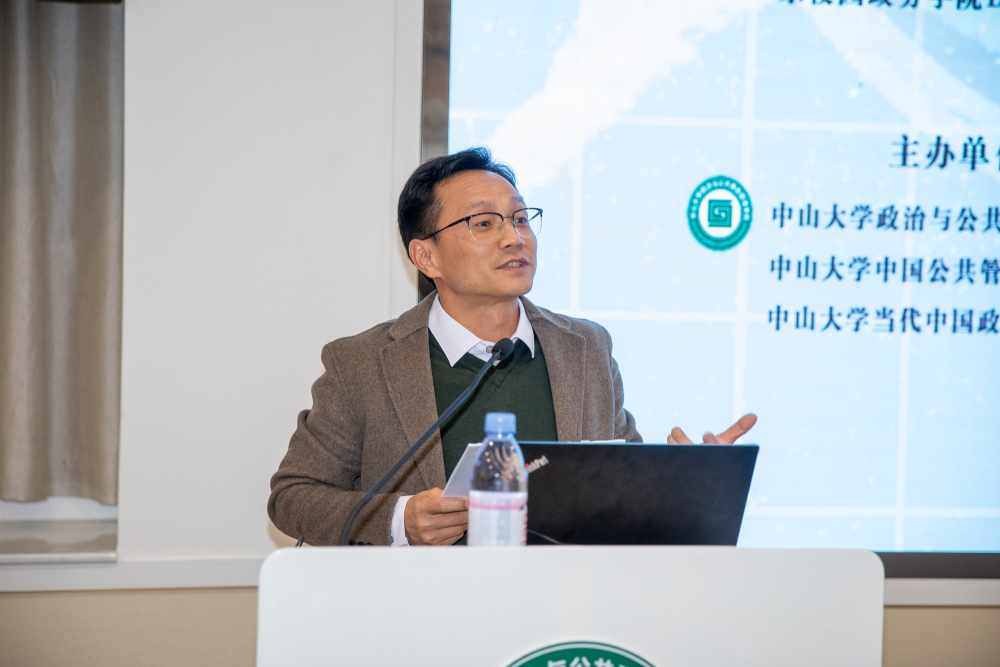
Dean Tan Ankui Delivering a Speech
Professor Luo Weidong highly praised the vision of the Program. In his insightful keynote speech, he started by analyzing on the historical context that gave rise to classical political economy. In the 15th century, marked by the disintegration of the European system of political and religious integration, nation-states had to grapple with the challenges of how to accumulate national wealth and how to conduct governance, the latter of which involved the construction of social order and the coordination of social interests. In the 16th and 17th centuries, the implication of “interest” experienced a shift from a sense of honor to tangible rewards. Against this backdrop, thinkers like William Petty, Adam Smith, David Ricardo, and John Stuart Mill emerged, offering comprehensive theoretical explanations for the functioning mechanisms of economy, politics, and society. Professor Luo Weidong extracted the core concepts from their works, followed by an exploration of Adam Smith’s theories regarding national wealth, economic and social order, and the moral foundation of a just society. In conclusion, Professor Luo Weidong highlighted the contemporary relevance of classical political economy, focusing on such themes as division of labor, market dynamics, social order, and limited government. The lecture, though delivered with simplicity, resonated with profound insights. Professor Luo Weidong skillfully unraveled the intricate theories of classical political economy and employed them to prompt contemplation of reality, offering inspiration and enlightenment to the audience.
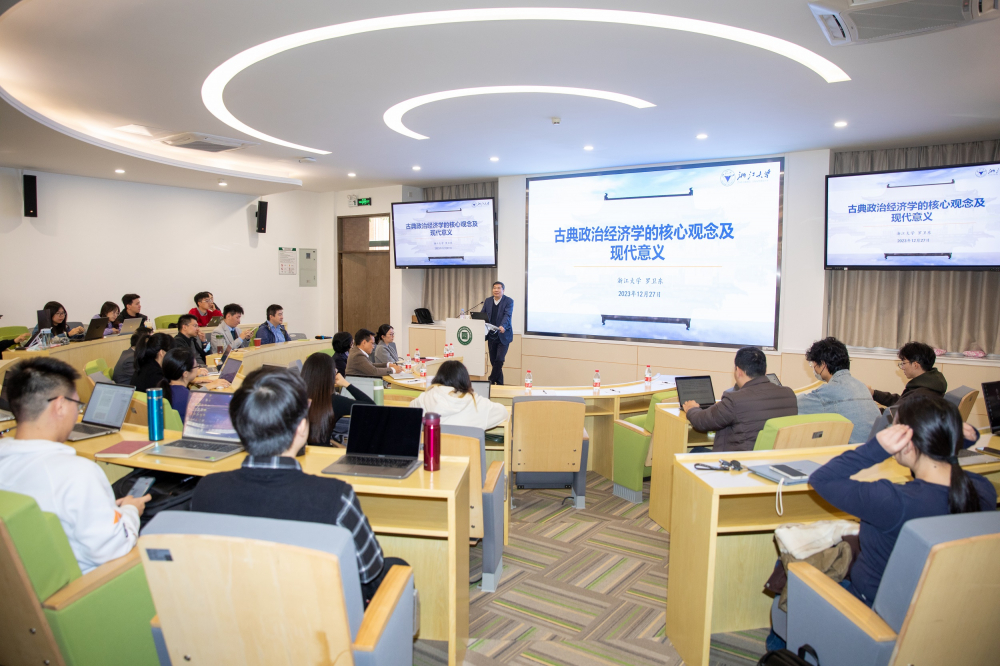
Professor Luo Weidong Delivering a Keynote Lecture
The subsequent dialogue session engaged participants in discussions on the role of state power in market formation and operation, the evolution from classical to modern political economy, and other topics. Professor Tan Ankui emphasized Professor Luo Weidong’s contribution to understanding the core issues of modern politics and economy by tracing the roots of classical political economy in social upheavals from the beginning of modern society. Assistant Professor Zhao Yutao added to the in-depth conversation by discussing the connection between the global market economy and nation-states, and the “disassembling” of the market from society. She argued that the creation of free trade markets is intricately tied to a nation-state safeguarding its interests. In the contemporary market economy, a tension exists which is generating connections while highlighting separateness at the same time. Professor Luo Weidong pointed out that Adam Smith’s theory endeavors to explore the fundamental mechanisms governing economic and social operations, the historical role of nation-states and the impact of state power on market expansion. The ongoing evolution of theory and reality remains crucial for addressing these inquiries. Adam Smith, characterized by a unique blend of theoretical acumen and practical awareness, demonstrated a cautious approach to complex real-world issues while distilling universal laws.
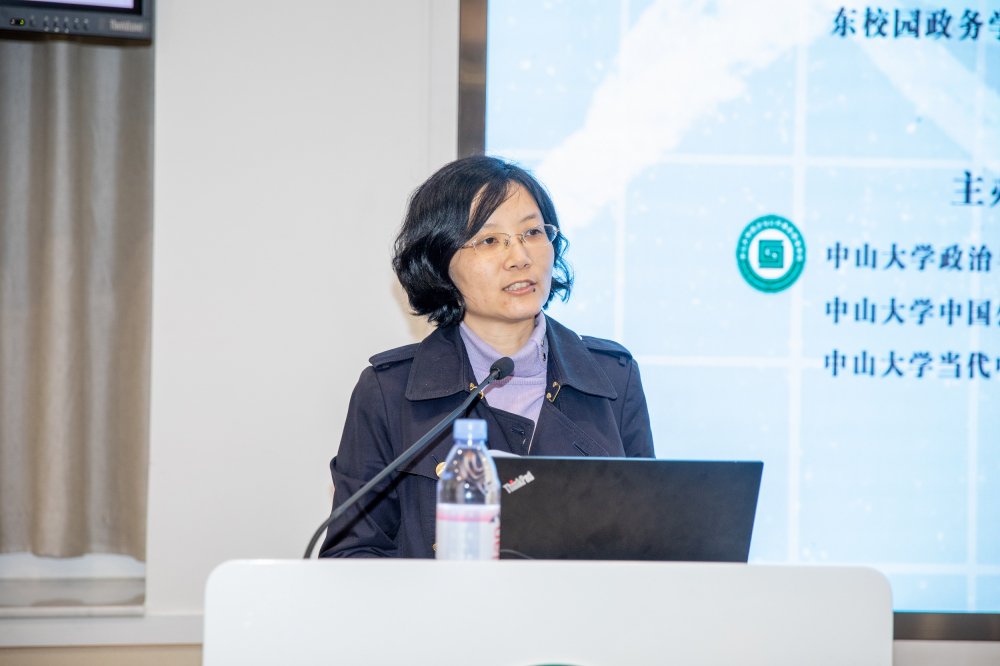
Assistant Professor Zhao Yutao Providing Review
During the Q&A session, attendees probed further into Adam Smith’s perspectives on the state and his place in the history of moral philosophy. Professor Luo Weidong, drawing upon his profound theoretical knowledge, provided detailed insights into Adam Smith’s moral philosophy, emphasizing the role of social and cultural atmosphere and institutions as foundational elements for the spontaneous operation of economic and moral orders.
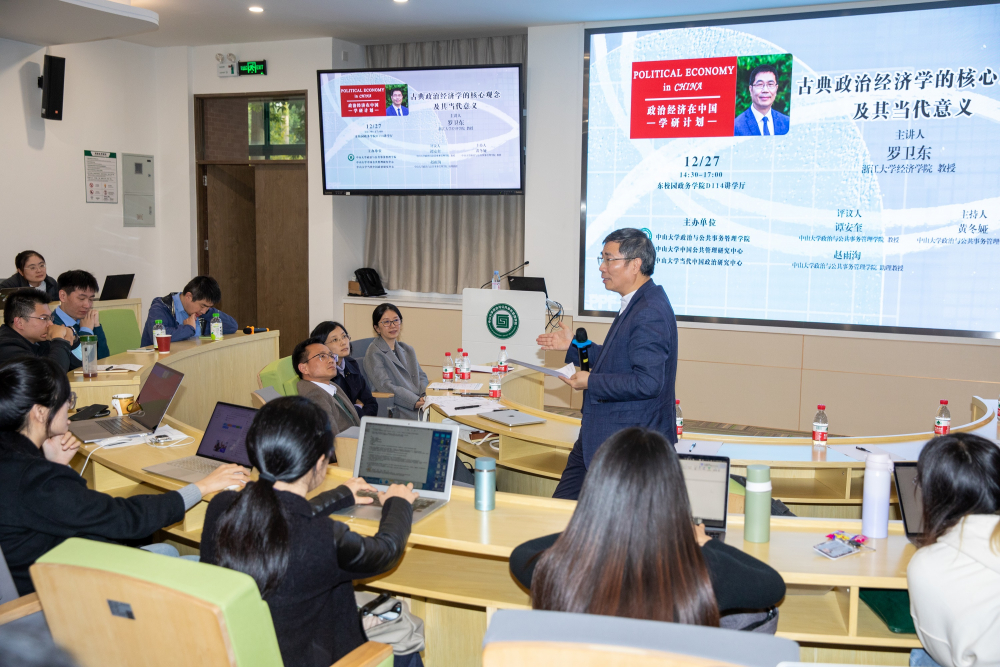
Interaction Between Teachers and Students
The event concluded with Dean Tan Ankui presenting a commemorative plaque to Professor Luo Weidong, expressing gratitude for the invaluable academic exchanges.
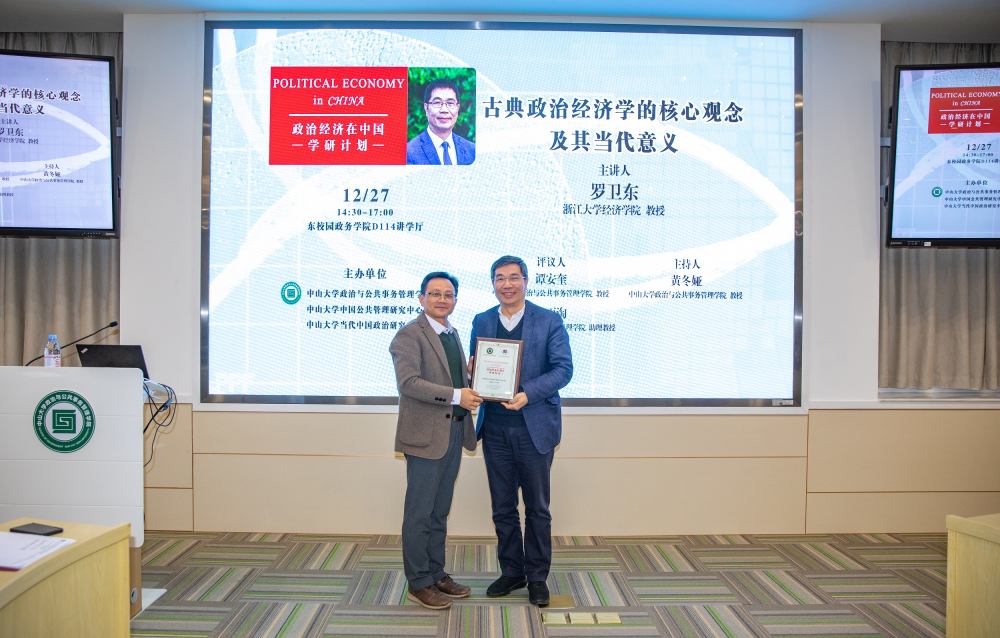
Professor Tan Ankui Presenting the Commemorative Plaque to Professor Luo Weidong
The lecture has facilitated a profound comprehension of the interpretation and insights into classical political economy theory within the context of “modernity” . It encourages students to reconnect with classic literature, reflect on the complexities of the contemporary world, and motivates teachers and students of the SOG to actively engage in addressing pressing issues of our time through the application of interdisciplinary perspectives and holistic academic thinking.
The “Political Economy in China” Study and Research Program is committed to examining the fundamental relationship between politics and economics, offering valuable insights to the academic community and readers on major issues such as modernization and national governance. Future endeavors will continue to showcase innovative academic achievements through a variety of means such as theme reports and academic dialogues, placing China’s distinctive approach to political and economic relations on the global stage and contributing to the theoretical framework of political economics with universal academic value.



